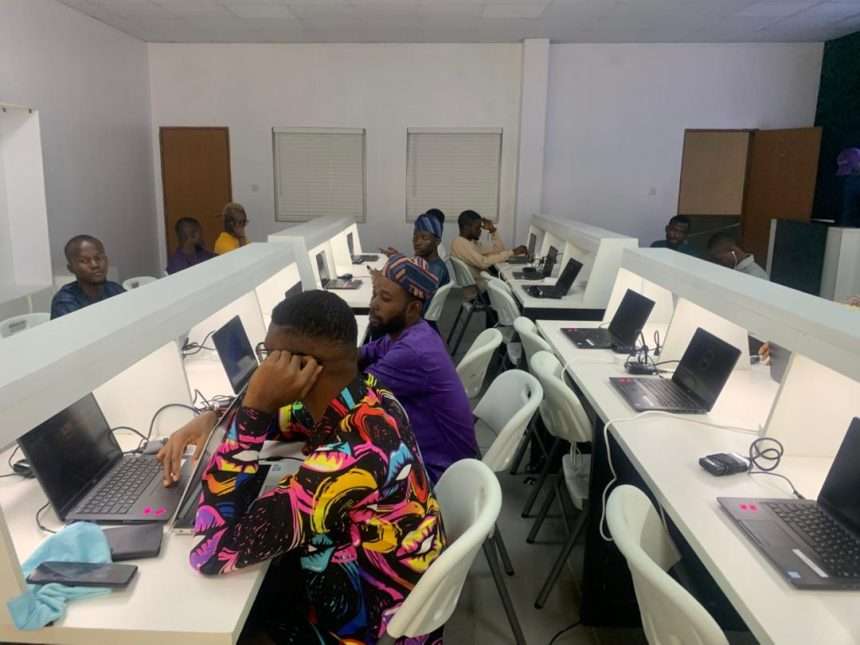In Nigeria, Ogun State, a southwest region, has embarked on an initiative to bridge the country’s tech skills gap by creating new digital economy jobs.
The state government in a new partnership with Cybervilla, a Nigerian tech solutions company, is set to equip local youth with practical skills in phone and tech device repairs at the Ogun TechHub.
This collaboration, according to expert, signals fresh momentum in developing the region’s digital workforce by empowering young Nigerians with in-demand skills.
About Cybervilla
Cybervilla is a Nigerian tech solutions company focused on repairs, sales, and digital skills training.
Its founder and CEO, Ifeanyi Adirika, is an entrepreneur with years of experience in technology services and youth empowerment initiatives.
Cybervilla aims to democratize access to technical skills while contributing to Nigeria’s evolving digital economy.
Catalyst for self-reliance
Governor Dapo Abiodun, speaking at the official launch of Cybervilla’s operations at the Ogun TechHub, described the initiative as a catalyst for self-reliance among the state’s young population.
“Ogun TechHub is a place where young people shape ideas into solutions,” he said. “With this partnership, we’re giving them tools not just to earn a living but to build businesses.”
What you should know
- Cybervilla’s training program is set to run for 12 weeks, focusing on repairs of mobile phones, laptops, and office equipment.
- Participants will also gain business acumen, preparing them to thrive as independent entrepreneurs or skilled technicians.
Cybervilla’s Chief Executive Officer, Ifeanyi Adirika, said that the program would initially train 50 youths, who will also receive work tools and employment opportunities either within Cybervilla or through government-linked placements.
“Beyond repairs, we’re building future entrepreneurs who will contribute meaningfully to Nigeria’s digital economy,” Adirika said.
Why it matters
Adirika noted that Ogun’s strategic positioning and tech-friendly policies are attracting firms like Cybervilla, eager to invest in local talent development.
According to Governor Abiodun, the initiative aligns with the state’s broader digital economy strategy, emphasizing vocational skills as a pathway to sustainable youth empowerment.
Techparley gathered that participants have described the free training as a chance to become self-sufficient as well as an employer of labour.
Timelines and Next Moves:
- The first 12-week training cohort has commenced at Ogun TechHub.
- Cybervilla plans to launch device sales and services on-site, allowing trainees to gain practical, commercial experience.
- Future cohorts are planned to expand reach and deepen the tech ecosystem in Ogun State.
Talking Points
Nigeria’s digital economy is booming, yet millions of youths remain unemployed or under-skilled. Initiatives like Cybervilla’s training program represents practical steps toward bridging the skills gap by creating sustainable livelihoods, and diversifying the economy beyond software startups.
Ogun State, therefore, deserves praise for initiating this partnership. But the big question is sustainability.
- Will Cybervilla be around in two years, or will they vanish after the pilot?
- Will graduates find real customers, financing, and affordable rent to open shops, or will they end up unemployed again?
- Will the government keep supporting them with procurement contracts and market access?
Nigeria is full of flashy youth programs that collapse once the cameras leave. That’s what people should watch closely.
Across Africa, there’s an army of young phone repairers, PC fixers, and electronics traders working under the radar. They rarely feature in reports from Silicon Valley investors or international development banks. But they are the silent backbone of connectivity.
Imagine Nigeria without the street-corner guys who replace your cracked screen or fix your dying laptop.
We need policies and credit schemes that help these people formalize, pay taxes, and grow real businesses. That’s how you build an inclusive digital economy—not just one that exists on paper.





